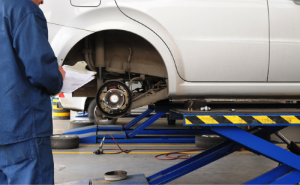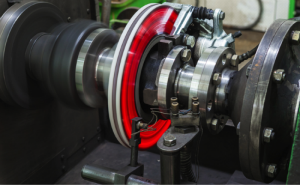The brakes are arguably the most important safety feature of your car. Unfortunately, many car owners let major issues fall by the wayside, not wanting to invest the time or money required to fix them. However, when it comes to your brakes, you can’t afford to compromise. While other problems might keep your car from starting, brake trouble will keep it from stopping, posing a major risk to you and your passengers.
How to Perform a Brake Test
Brake failure can result from a few different issues. According to Esurance, one of the major sources of brake failure is worn out brake pads, which will need to be replaced. It could also be due to leaked fluid or the brakes overheating. Your brakes could have any number of other problems.
The best cure is prevention; it’s a very good idea to perform a quick braking test every time you get behind the wheel. The Smart Driving resource recommends that drivers do both static and rolling brake tests.
For a static brake test, press down on the brake pedal with your foot as soon as you get in the car. You should feel a lot of resistance from the pedal. If it feels soft or if you can push down easily, you may have a problem with your brake fluid, which makes the car unsafe to drive.
For a rolling brake test, check your brake pedal as soon as you start the car. As you slowly begin to drive, gently press the pedal and come to a complete stop before you take off. If you notice any of the following issues, you should get your car serviced immediately.
Warning Signs of Brake Failure
Some of the most common warning signs include:
- The ABS indicator light is on. The antilock brake system relies on the car’s overall electrical wiring. As a best practice, don’t ignore any alert signs on your dashboard. If the ABS or another indicator is lit, take your car to the mechanic right away.
- The brakes are making noise. Squealing, grinding, and clicking indicate many potential issues. If your brake pads have worn too thin, the resulting friction can cause the brake to squeal when you press down. If you don’t address the issue right away, it could progress to a grinding noise, indicating that you’ve worn all the way through to the rotors. A loose or broken spring will click, while a bent drum or misshapen rotor may make a pulsating sound.
Some (especially newer) cars have built-in sensors that will produce a loud, obnoxious screeching sound when you press down or release. This is a surefire indication of excess wear. If your car doesn’t have this function, you’ll need to listen carefully for any sign of a problem.
- Your wheel shakes when you brake. Even if you don’t hear any noise, a steering wheel shaking in your hands might indicate warping of your drum, motor, or broken brake discs.
- Your car drags or pulls. An accumulation of rust on your emergency brakes will make them act as though they’re “on,” even if you’ve adjusted the lever to turn them off. If you feel too much drag as you speed up, this may be the problem. If you feel your car pulling off to the side as you drive, you might have misaligned brakes or leaking brake fluid.
- The pedal is too low. According to Auto Repair for Dummies, hydraulic disc brakes always automatically self-adjust. Drum brakes don’t have the same system in place, so their adjustment mechanisms may break or stick. As the drum wears out, broken adjusters will result in a low pedal.
Alternately, there may be too much air in the brake system. This problem is usually fairly easy to resolve, but you’ll need a mechanic to diagnose it. A simple brake bleed will usually do the trick.
While these are some of the most common indicators of brake trouble, they’re not the only ones. If something simply feels “off,” it’s always worth finding out the cause.
Keep Up with Routine Inspections
If you notice an issue, never wait for it to get worse. Any of the above symptoms could indicate an even bigger problem than you initially thought. One of the best vehicular safety precautions you can take is to have your car inspected and serviced on a regular basis to address any problems before they get worse.
According to the National Institute for Automotive Service Excellence (ASE), routine maintenance will also save you money in the long run. By catching smaller problems before they turn into irreparable issues, you’ll prolong the life of your car, reduce emissions, and improve your gas mileage. Investing in minor repairs and adjustments on smaller issues will far outweigh the cost of needing a major part repair or replacement.
If you’re not sure about when you’re due for a tune-up, check your owner’s manual for the manufacturer’s recommended maintenance schedule. If it’s been awhile, you may be overdue – which means it’s time to head to the shop.
Head On Down to RC Auto Specialists
At RC Auto Specialists, we’re thrilled to be a go-to auto mechanic for Tulsa-area drivers. If you have a problem with your brakes, don’t wait around, because it won’t get better on its own. To get a sense of how we can help, feel free to check out our website. We offer repair and diagnostic services for every part of your vehicle. Our specialty is Ford vehicles, but we can work expertly on any make or model.
We want you to get back on the road as much as you do! If you need more information, contact us today by calling or filling out our online form to make a request. You can also schedule your appointment online; simply enter your preferred time and day and we’ll get back to you to confirm. At RC Auto Specialists, we’re certified by Repair Pal to meet all of your needs for auto repairs and diagnostics.

